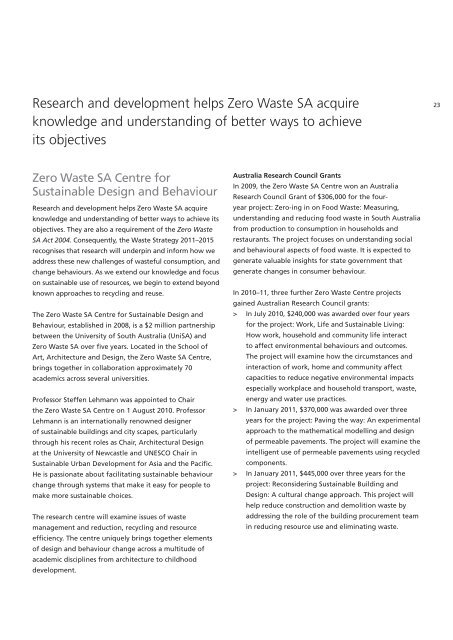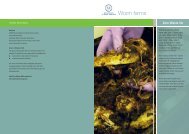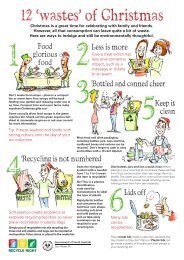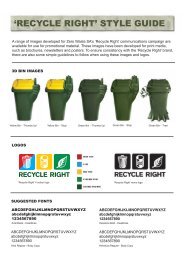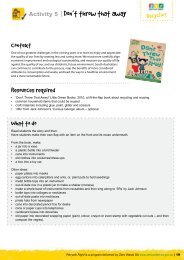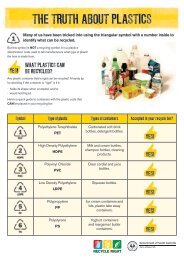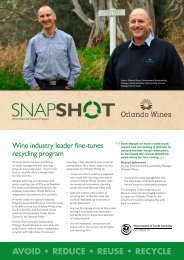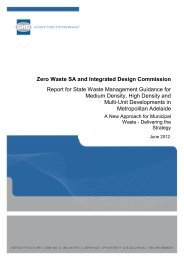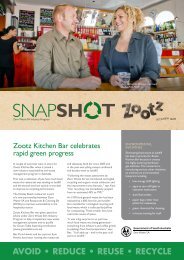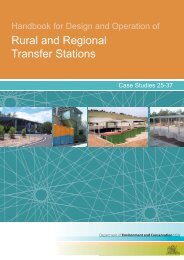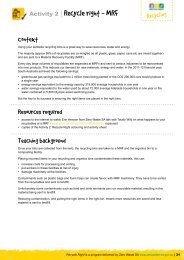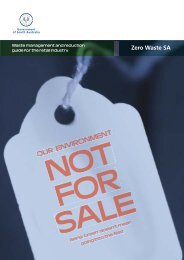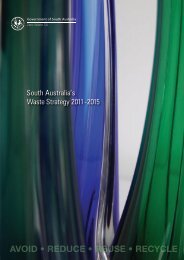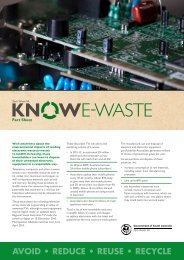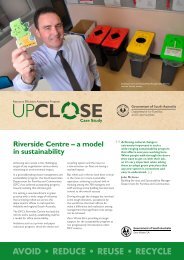Annual Report 2010-11 - Zero Waste SA - SA.Gov.au
Annual Report 2010-11 - Zero Waste SA - SA.Gov.au
Annual Report 2010-11 - Zero Waste SA - SA.Gov.au
You also want an ePaper? Increase the reach of your titles
YUMPU automatically turns print PDFs into web optimized ePapers that Google loves.
Research and development helps <strong>Zero</strong> <strong>Waste</strong> <strong>SA</strong> acquire<br />
knowledge and understanding of better ways to achieve<br />
its objectives<br />
23<br />
<strong>Zero</strong> <strong>Waste</strong> <strong>SA</strong> Centre for<br />
Sustainable Design and Behaviour<br />
Research and development helps <strong>Zero</strong> <strong>Waste</strong> <strong>SA</strong> acquire<br />
knowledge and understanding of better ways to achieve its<br />
objectives. They are also a requirement of the <strong>Zero</strong> <strong>Waste</strong><br />
<strong>SA</strong> Act 2004. Consequently, the <strong>Waste</strong> Strategy 20<strong>11</strong>–2015<br />
recognises that research will underpin and inform how we<br />
address these new challenges of wasteful consumption, and<br />
change behaviours. As we extend our knowledge and focus<br />
on sustainable use of resources, we begin to extend beyond<br />
known approaches to recycling and reuse.<br />
The <strong>Zero</strong> <strong>Waste</strong> <strong>SA</strong> Centre for Sustainable Design and<br />
Behaviour, established in 2008, is a $2 million partnership<br />
between the University of South Australia (Uni<strong>SA</strong>) and<br />
<strong>Zero</strong> <strong>Waste</strong> <strong>SA</strong> over five years. Located in the School of<br />
Art, Architecture and Design, the <strong>Zero</strong> <strong>Waste</strong> <strong>SA</strong> Centre,<br />
brings together in collaboration approximately 70<br />
academics across several universities.<br />
Professor Steffen Lehmann was appointed to Chair<br />
the <strong>Zero</strong> <strong>Waste</strong> <strong>SA</strong> Centre on 1 August <strong>2010</strong>. Professor<br />
Lehmann is an internationally renowned designer<br />
of sustainable buildings and city scapes, particularly<br />
through his recent roles as Chair, Architectural Design<br />
at the University of Newcastle and UNESCO Chair in<br />
Sustainable Urban Development for Asia and the Pacific.<br />
He is passionate about facilitating sustainable behaviour<br />
change through systems that make it easy for people to<br />
make more sustainable choices.<br />
The research centre will examine issues of waste<br />
management and reduction, recycling and resource<br />
efficiency. The centre uniquely brings together elements<br />
of design and behaviour change across a multitude of<br />
academic disciplines from architecture to childhood<br />
development.<br />
Australia Research Council Grants<br />
In 2009, the <strong>Zero</strong> <strong>Waste</strong> <strong>SA</strong> Centre won an Australia<br />
Research Council Grant of $306,000 for the fouryear<br />
project: <strong>Zero</strong>-ing in on Food <strong>Waste</strong>: Measuring,<br />
understanding and reducing food waste in South Australia<br />
from production to consumption in households and<br />
rest<strong>au</strong>rants. The project focuses on understanding social<br />
and behavioural aspects of food waste. It is expected to<br />
generate valuable insights for state government that<br />
generate changes in consumer behaviour.<br />
In <strong>2010</strong>–<strong>11</strong>, three further <strong>Zero</strong> <strong>Waste</strong> Centre projects<br />
gained Australian Research Council grants:<br />
> In July <strong>2010</strong>, $240,000 was awarded over four years<br />
for the project: Work, Life and Sustainable Living:<br />
How work, household and community life interact<br />
to affect environmental behaviours and outcomes.<br />
The project will examine how the circumstances and<br />
interaction of work, home and community affect<br />
capacities to reduce negative environmental impacts<br />
especially workplace and household transport, waste,<br />
energy and water use practices.<br />
> In January 20<strong>11</strong>, $370,000 was awarded over three<br />
years for the project: Paving the way: An experimental<br />
approach to the mathematical modelling and design<br />
of permeable pavements. The project will examine the<br />
intelligent use of permeable pavements using recycled<br />
components.<br />
> In January 20<strong>11</strong>, $445,000 over three years for the<br />
project: Reconsidering Sustainable Building and<br />
Design: A cultural change approach. This project will<br />
help reduce construction and demolition waste by<br />
addressing the role of the building procurement team<br />
in reducing resource use and eliminating waste.


